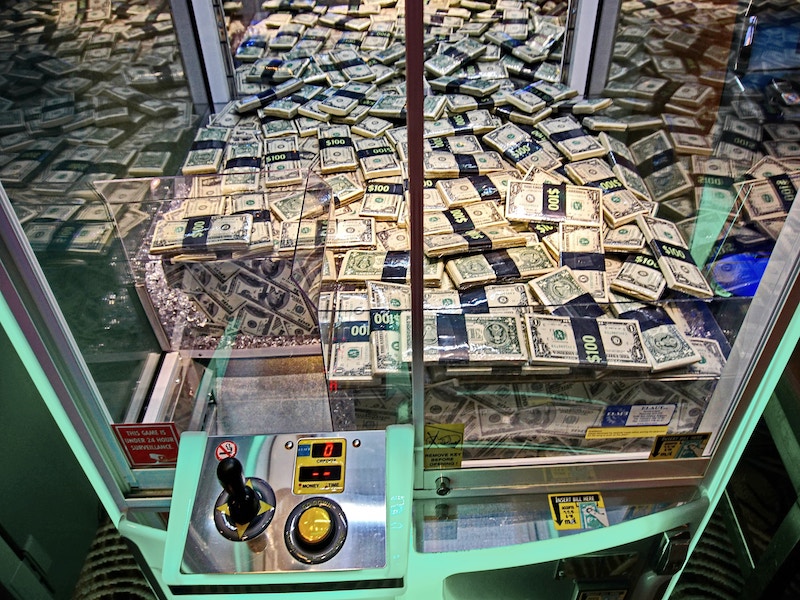We’re in the midst of a climate emergency, and yet the rules of the game continue to go unquestioned
The claw machine is an arcade staple that’s as easy to play as it looks. You carefully manoeuvre the claw to a certain area, press the ‘go down’ bottom, and hope you’ve placed the claw in just the right area to win a prize. Just like the claw machine, our lives are shaped by a set of rules. Unlike the claw machine, the rules of the game of life aren’t so simple. They’re also so all-consuming that it’s as if they don’t exist at all. But our lives are shaped by rules, rules that are determined by the preeminent economic ideology that dominates the world — free market capitalism. Seeing as our lives are governed by and work in service of this all-consuming rule system, a crucial question that continues to be ignored is — can capitalism take us from where we are, which is a system that leads to catastrophic environmental impacts, to where we need to be, which is an economic system that provides for human needs within environmental limits? To put it another way, is capitalism sustainable?
Well, in modern society, social success is measured by how much money and possessions we have compared to everyone else. The ultimate aim of the game is to become the richest. Being the richest naturally makes you the most successful. The issue with this culture of consumption, and high living standards generally, is that all of the stuff we consume doesn’t appear out of thin air. Consumer society is fed from energy and material inputs that come from the natural world. Eighty per cent of our energy demands are met through fossil fuels. Fossil fuels are, of course, the main cause of greenhouse gas emissions that have culminated in the climate crisis. Reducing the energy intensity of our lifestyles is clearly fundamental to reducing our dependence on fossil fuels, which will help decrease emissions. But the energy-intensive lifestyles accompanying consumerism are fundamental to a capitalist economy because they work in service of the foundational belief that holds the system together, namely, economic growth.
Economic growth compels certain behaviour and decision-making. The need to achieve economic growth is why governments live and die by the sword of increasing gross domestic product; it’s why businesses are driven to maximise profits; it’s why individuals are driven to increase their incomes so they can consume more. The result of billions of individuals working in service to economic growth is that, more often than not, the economy expands. The fact never-ending economic growth is a necessity for capitalism to sustain itself means that at the heart of the economy lies an assumption — any limits to economic growth will always be overcome by efficiencies. These efficiencies will be driven by technological innovation.
The fundamental issue with this assumption is that, due to the laws of thermodynamics, and the fact the material world around us is physically limited, infinite growth on a finite planet is impossible. Efforts to move to a sustainable society currently revolve around incremental changes that focus on the effects of the problem without questioning the underlying causes, namely, the beliefs feeding capitalism. This strategy is inappropriate because it’s those beliefs that lead to behaviour that can’t be sustained. So long as the sustainability of economic growth continues to continue to go unquestioned, it will compel the same behaviour that leads to increasing environmental impacts, which will, in turn, increase the risk of social collapse. What’s required to move from an unsustainable society to a sustainable one is the redesign of the economy and, with it, society, around sustainable principles. But we can’t simply design an economy and society that gives us the best chance of moving towards a sustainable path. Any solution to the problems we face must be developed within the social construct that has created the problem. In other words, we are stuck in a trap of our own making.
The all-encompassing nature of society means we can’t see that our lives, our beliefs, our values, our behaviour, all are an outcome of ideology. Climate scientists and environmentalists are growing increasingly alarmed at the catastrophic changes we’re making to the natural world. But politicians and businesses remain convinced that market solutions, driven by technological innovation, will act as some kind of silver bullet. From their perspective, the climate crisis is merely a technical problem. The underlying assumption is that if we dedicate enough time, effort and money to it, technology will save the day. The supreme confidence in capitalism’s ability to overcome any challenge thrown at it stands in contrast to an inconvenient truth. As the pre-eminent climate scientist Will Steffen puts it, “history has shown that civilisations have risen, stuck to their core values and then collapsed because they didn’t change.” That’s exactly where we are today. As long as capitalism goes unquestioned, you can be confident that incrementalism will remain the order of the day. Meanwhile, we’ll continue to hurtle towards collapse and a future of unimaginable suffering.



